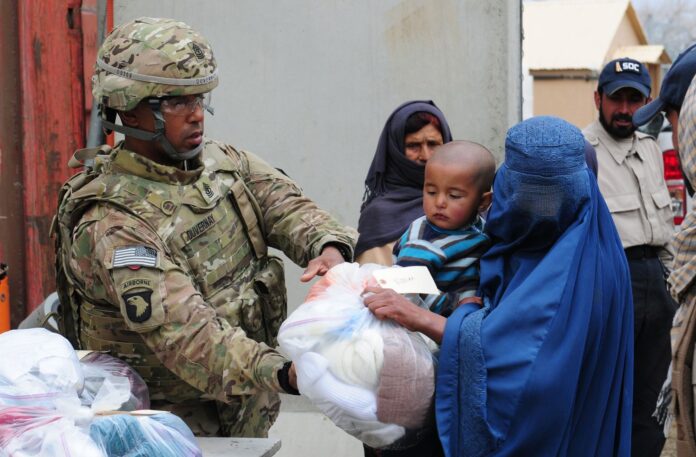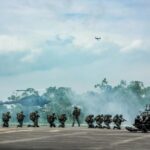Civil-military relations involve the interactions of the military as an institution with civilian actors, groups, and organizations within or across countries. In fragile states where governance structures are weak, these relations play a crucial role in shaping stability, security, and sustainable development. The military’s role extends beyond traditional defense to include governance functions, humanitarian aid, and even economic management in some cases. The extent to which the roles of military and civilian actors (e.g., non-governmental organizations) are blurred in fragile states can either lead to stability or further destabilization, depending on the level of engagement and collaboration between them.
Numerous academic studies, perspectives, and theoretical frameworks have been dedicated to examining civil-military relations in democratic and authoritarian states, as well as in states that are impoverished or wealthy, during different historical periods that are characterized by peace or war. However, our understanding of how these relationships operate in fragile states is limited. It is possible that this lack of knowledge is due to the difficulties associated with researching the nature of these relationships in socially, economically, and/or politically unstable places, which are often referred to as “gray areas.” On June 24, 2024, in a webinar as part of the NAVI Speaker Series, we had the pleasure of hosting Dr. Stanislava Mladenova, the author of “When Rambo Meets the Red Cross: Civil-Military Engagement in Fragile States,” to discuss the complex nature of civil-military relations in fragile states. One of the main challenges in studying these relationships is the need to adopt an interdisciplinary approach that incorporates insights from various fields of study. This is because the fragility in these states is often caused by a multitude of interrelated social, economic, and political factors that must be examined holistically. Dr. Mladenova pointed out in the webinar that fragility can be perceived in various ways depending on the disciplinary perspective. To a sociologist, it may signify the brokenness of the social contract between a government and its citizens, while from another viewpoint, it could simply mean a lack of fundamental security. Dr. Mladenova’s research on this subject is notably beneficial as it delves into different facets of the issue and adopts an interdisciplinary approach to provide the necessary insights.
During the webinar, we covered a wide range of important topics, including the differences and similarities between civilian NGOs and military units in their missions, objectives, and approaches to humanitarian and development efforts, the clearance processes in the civil-military collaboration, the effects of short deployment cycles on maintaining long-lasting relationships, the role of private security companies, and the sustainability of the civil-military relations in fragile states. One of the important topics that we discussed was the education of the SOF personnel, especially regarding the language, culture, and history of the fragile states in which these personnel operate. As emphasized in a commentary by Andrew Gilmour published in 2023 entitled, “The Enduring Importance of the Humanities in the Work of Intelligence,” the lack of education in the humanities, such as history, religion, culture, and languages, can lead to difficulties in comprehending societal and regional dynamics, which can pose a significant threat to national security. Similarly, Dr. Mladenova argued in her book that today’s Special Forces are younger and more focused on action, with less knowledge of language and culture than previous generations. During the webinar, Dr. Mladenova also discussed past efforts to implement the Human Terrain System and emphasized that understanding the human dimension should not be limited to lethal objectives but should also consider other aspects of the issue. In line with Dr. Mladenova’s comments, we believe that comprehending the human dimension is crucial for civil-military relations in fragile states and the perceptions of the military by the people of the host nation. This can also influence the effectiveness of humanitarian and development initiatives. It is important to listen to the voices of the people of the host nations and local communities to ensure the establishment of inclusive and democratic governance frameworks that are vital for long-term stability. Failing to do so may lead to the perpetuation of authoritarianism and exacerbate instability. Furthermore, it is essential to consider other factors in post-conflict settings, such as the dominant role of the military, both domestic and foreign, and the militarization of governance, which can suppress civilian-led initiatives and delay the establishment of democratic political processes. Additionally, long-term foreign interventions may lead to the strengthening of military actors at the expense of civilian institutions, creating dependency and delaying the establishment of long-term stability.
The various examples from countries such as Afghanistan, Iraq, Somalia, and the Democratic Republic of Congo illustrate the diverse outcomes of civil-military relations in fragile states. For instance, in Afghanistan, decades of conflict have established a military-dominated governance structure, which has impeded democratic progress and persisted insecurity. On the other hand, Rwanda’s efforts to rebuild state institutions after the genocide demonstrate the potential for integrating military and civilian capacities to foster reconciliation and sustainable development. These cases highlight the importance of adopting a nuanced approach that emphasizes inclusive governance, civilian oversight, and the respect for human rights when navigating civil-military relations in fragile states. Effective strategies should aim to empower civilian state institutions while taking into account the unique security challenges posed by fragile contexts. International actors can also play an important role in supporting these efforts through targeted assistance and diplomatic engagement aimed at fostering stability and sustainable development. Reflecting on civil-military relations in fragile states highlights the need for adaptive policies that prioritize civilian leadership, institutional transparency, and accountability. By addressing these dynamics, stakeholders can reduce conflict risks and create conditions conducive to long-term peace and prosperity. We believe that discussions, such as our webinar with Dr. Mladenova, on these complex and sometimes controversial issues are essential as they may lead to a better understanding of these issues, which is a critical step in developing effective solutions.
Ugur Orak, Ph.D., is a criminologist and Assistant Professor in the Department of Sociology and Anthropology at Middle Tennessee State University. His research interests include developmental and life-course criminology, mental health, and military sociology.



